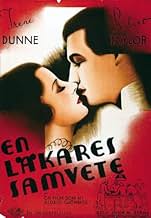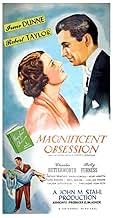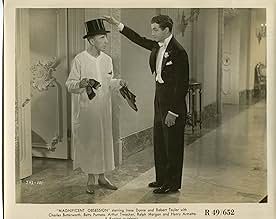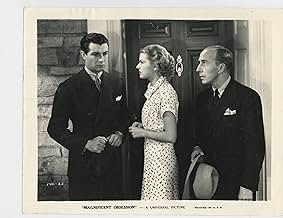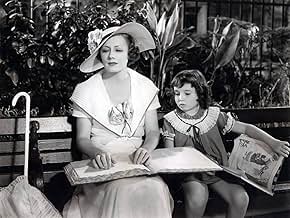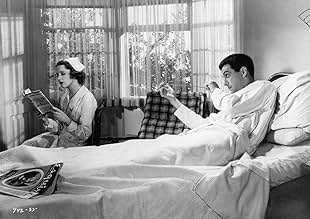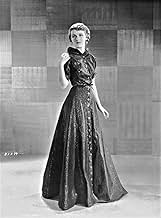A wealthy survivor of a hospital crisis later falls for a deceased doctor's blind widow. Inspired by the doctor's charitable values, he secretly aids her, studies medicine, and performs her ... Read allA wealthy survivor of a hospital crisis later falls for a deceased doctor's blind widow. Inspired by the doctor's charitable values, he secretly aids her, studies medicine, and performs her sight-saving surgery.A wealthy survivor of a hospital crisis later falls for a deceased doctor's blind widow. Inspired by the doctor's charitable values, he secretly aids her, studies medicine, and performs her sight-saving surgery.
- Awards
- 3 wins total
- Amy
- (uncredited)
- Chief Inspector
- (uncredited)
- Man on Pier
- (uncredited)
Featured reviews
The original and less glossy version.
The story begins with the death of a famous and beloved doctor. It seems when the doctor needed life-saving equipment, it was being used on a drunk playboy who has pretty much led a selfish and worthless life. He feels bad about this, at least as much as he can at this point. But later when his actions ALSO cause the widow to become blinded, he suffers a huge crisis and dedicates his life to helping her and others.
Robert Taylor and Irene Dunne are very good here. But I didn't rate fhe film higher simply because while enjoyable, the film certainly seemed far-fetched and a bit schmaltzy. Still, it is worth seeing.
The Original Outshines
I Am Not A Fan Of Tearjerkers
It took fourteen writers, director John Stahl, and the usual vast array of actors and technicians to make this piffle hang together, confirm Miss Dunne as an A-list star, and show MGM, Taylor's home studio, that he could stand up to the strain. It was another hit for Stahl in his annual weepie fest for Universal in the 1930s You can see the snipped-off plots from Lloyd Douglas's novel. How did Charles Butterworth wind up married to Betty Furness (gives a decent performance, by the way). What is Sara Haden doing there? Did they try to get Otto Kruger for the Ralph Morgan role?
These and other questions linger in the background of my mind, even as I consider the question of euthanasia. I can admire the practical results as a matter of commercial film making, even though this sort of movie annoys the heck out of me.
The magnificent theory.
Randolph's character seems more important in Stahl's version.His theory is certainly moving:You've only got what you give and you should not expect any award.Merrick tries to apply this theory,first because he wants to seduce the wife of the philanthropist/doctor who indirectly died because of him,because he was an alcoholic playboy.He has not really understood what Randolph tried to explain to him.The scene with the hobo comes as a comic relief,which is terribly needed in such a dark yarn.When ,as leaving the poor man,Merrick thinks he's got some divine reward,he's completely mistaken.A Christian movie,"magnificent obsession" sure is,as Randolph,in his second scene ,mentions the Christ. After all,his theory is not that much far from that of James Stewart's guardian angel in "it's a wonderful life".
Unlikelihoods are here there and everywhere,but it's the rules of melodrama.The story ,which includes death,blindness,moral and physical redemption,is not more far-fetched than westerns and thrillers plots.And life is so strange that it can turn sometimes into the most implausible melodrama;and like it or not,not necessarily with a happy end.
A Big Hit On the Road
It was a best seller in 1929 for newly minted writer Lloyd C. Douglas, a former Methodist minister who had retired from the pulpit and spent the rest of his life writing fictional works with a religious theme.
Irene Dunne was by this time a very big star and Magnificent Obsession entered the pantheon of her big hit films. But for Robert Taylor it was the breakout film of his career, establishing him once and for all as a star player with potent box office.
Taylor was a special favorite of Louis B. Mayer at MGM, it wasn't an accident he established a record for the longest studio contract in film history. Taylor was coming along in his career quite nicely as and had gotten notice in some supporting roles and had even had a lead in Murder in the Fleet. He had also played part of a love triangle as another doctor in Society Doctor with Chester Morris and Virginia Bruce.
I'm betting that it was that this was the film that Carl Laemmle saw at Universal when he asked Mayer for Taylor's service on a loan out. This would have been a win-win situation for MGM. If Taylor clicked they had his services and if he didn't it was Universal's loss.
Anyway it was in this role as the shallow playboy who becomes a noted surgeon that Taylor scored his big hit. His growth in some ways is similar to Tyrone Power's later on in The Razor's Edge. In fact had this been done at 20th Century Fox Power would also have had a big hit. But his breakthrough year was one year away.
Through a combination of unfortunate circumstances a noted doctor, esteemed for his good works dies suddenly of a heart attack. He might have been saved, but a resuscitator was being used on a young Taylor who was involved in a speeding boat accident. He becomes a hated figure with the family and friends of the late doctor, especially his new widow, Irene Dunne.
Later on Taylor while in an inebriated state meets up with Ralph Morgan who lets him spend the night and sober up on his couch. When Taylor awakens, Morgan talks to him about trying to tap into a higher power by doing some good works and it will redound to his favor on earth and in heaven. And the idea is to shun publicity for the same.
Taylor expects some more immediate return on good works, but it he gradually comes to a full realization of what Morgan is talking about. Former minister Lloyd C. Douglas had used as the basis for this philosophy, Matthew Chapter 6, 1-4. The substance of which don't flaunt your good works before humanity openly because then you'll be courting favor with the world. But if you do it with as little fanfare as possible, God will reward you in heaven and on earth.
Robert Taylor was 24 when he made this film and the part called for him to age several years and he succeeds as both the playboy and the mature and spiritual doctor. Magnificent Obsession was remade 19 years later with Rock Hudson and Jane Wyman and proved to be as big a hit with audiences then as in the Thirties.
Robert Taylor made very few films away from MGM until his contract was up after 1958. I suppose his services were Louis B. Mayer's Magnificent Obsession.
Did you know
- TriviaThis film is featured as a bonus on Magnificent Obsession (1954), released by the Criterion Collection, spine #457.
- GoofsWhen operating on Helen's eyes, Merrick asks for an otoscope. He should have asked for an opthalmoscope. An otoscope is for ears.
- Quotes
Robert Merrick: Take back to the cook and tell her that if she brings back again, I'm gonna buy this hospital and fire her and everybody else in it. I want some decent breakfast.
Nurse: It's the same breakfast we serve all the patients.
Robert Merrick: Yeah, but I am "The Special".
- Alternate versionsAll prints now in circulation run 102 minutes.
- ConnectionsFeatured in The Universal Story (1996)
- SoundtracksRomeo and Juliet Fantasy-Overture
(uncredited)
Written by Pyotr Ilyich Tchaikovsky
Played under the opening credits
- How long is Magnificent Obsession?Powered by Alexa
Details
- Release date
- Country of origin
- Languages
- Also known as
- En läkares samvete
- Filming locations
- Production company
- See more company credits at IMDbPro
- Runtime
- 1h 52m(112 min)
- Color
- Aspect ratio
- 1.37 : 1

